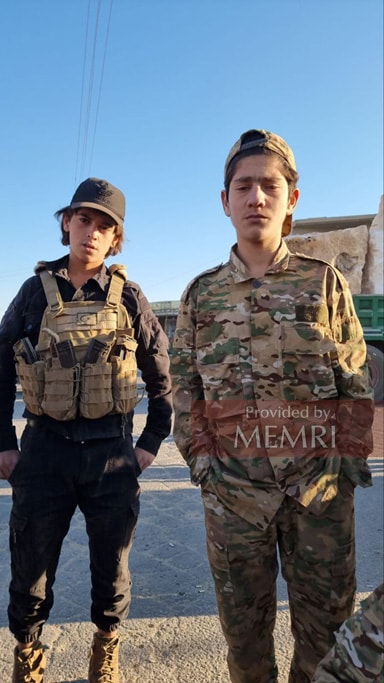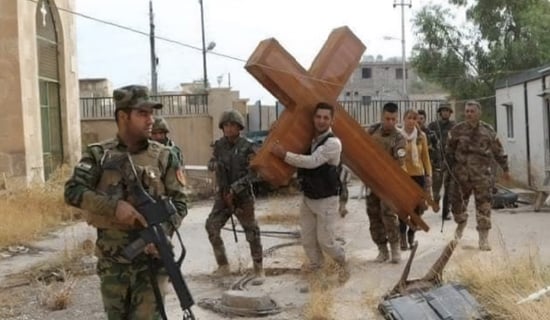Long a sinecure of former colonial powers, large parts of Africa have in recent years become a wide-open marketplace for new foreign players. While much of the focus – and hysteria – in the West has been about the resurgence of China and Russia in Africa, there is also a raft of ambitious middle or rising powers – Turkey, UAE, India, Israel, Egypt, Brazil – looking forward to project either economic or military or political power onto the continent.

Sultan Murad Division commanders in Syria campaigning against the Kurds (2022).
Ground zero, so far, for some of this new competition has been the Republic of Niger. The French are already out, the Americans are on their way out while the Russians, Chinese, Turks, and maybe even the Iranians are flowing in.
While the exodus of the French and Americans followed the July 2023 military coup in Niamey, Niger's efforts at the diversification of its defense ties predates that event. It was in late 2021 that the former democratic government of Niger signed a contract for Turkish Bayraktar TB2 drones. They were delivered in June 2022.[1] Turkey also sold Niger some armored vehicles and Hurkus-3 trainer aircraft suitable for ground attack and armed reconnaissance missions.[2] After the 2023 military coup, the new junta expressed gratitude to Russia, Turkey, and the UAE for welcoming them with open arms, in contrast with the reticence of the judgmental French and Americans.
Recent media coverage has revealed that there are already some Russian military contractors or soldiers on the ground in Niger, although nothing like the major Russian presence in countries like Mali and the Central African Republic.[3] But much more significant that the Russians seems to be the arrival of hundreds of mercenaries secretly flown in from Turkey over the past six months.

The mercenaries are not actually Turkish, although they are supplied by Turkey.[4] They are Syrians, Turkish-allied proxy militias, remnants from the Syrian Civil War. While in May 2024 there have been several articles about the arrival of these Syrian mercenaries in Niger,[5] Saudi-funded Al-Hadath television news reported on their arrival on January 27, 2024.[6] Relying on the Syrian Observatory for Human Rights, the broadcaster reported that up to 3,500 fighters from the Turkish-controlled Sultan Murad Division in Northern Syria would eventually be sent to Niger. Pro-Assad Syrian commentator Fares Shihabi had spoken even earlier on Twitter of the Turkish move into Niger as far back as December 27, 2023.[7]
This is the third time outside Syria that Turkey has deployed its proxy Syrian mercenaries. The first time was in the Libyan Civil War, in 2019, where Turkey's Syrian mercenaries at times confronted Syrian mercenaries contracted by Russia.[8] Turkey then drew from the same personnel pool in Syria for the Azerbaijan war in late 2020 against the Nagorno-Karabakh Armenians.[9]
The fighters are drawn not only from the Sultan Murad Division, but also from similar Turkish-controlled units, the Sultan Suleiman Shah Brigade and Hamza Division, militias long tinged with Islamist and/or Turkish supremacist ideology but also motivated by the need for money in a devastated Syria. A six-month contract at $1,500 a month with the possibility of $35,000 in case of disability and $60,000 in case of death for the fighters' family is a substantial inducement for desperate, impoverished Syrian men. In 2023, the minimum monthly wage for a Syrian government employee was less than $22 at the official exchange rate, even less at the parallel rate.[10]

Supposed Syrian child soldiers serving in Turkish Syrian militia ranks (2023)
Like many other irregular forces in Syria, these Turkish proxy militias have a horrific human rights record going back more than a decade. While they are technically part of the so-called Syrian National Army reporting to a supposed Syrian exile government, they are entirely tools of Turkish statecraft. As such Turkey has used them against rival Arab militias, against the Assad regime and especially, against Kurdish rebel groups in Syria, a high priority target for Ankara. In February 2024 Human Rights Watch issued a detailed report on the depredations of these Turkish-directed militias including serious abuses of both human rights and humanitarian law, including indiscriminate shelling, summary killings, unlawful arrests, torture, and enforced disappearances, and systematic pillaging and unlawful seizure of property.[11]
Both the Sultan Suleiman Shah Brigade and Hamza Division and their leaders were sanctioned for human rights abuses by the U.S. Department of the Treasury in August 2023.[12] And yet Washington, which was so vociferous about the dangers of the Russian Wagner private military company in Africa, has been much more muted about these other killers being sent to Africa.

Syrian fighters flashing the Turkish nationalist Grey Wolf[13] salute (2021)
Perhaps this is because the U.S. government sees these Turkish-directed death squads as useful substitutes or potential replacements for Wagner? Here the great irony is that in several of the recent reports about the sending of these Syrian mercenaries to Niger it is clearly stated that they will be fighting alongside the Russians, rather than as adversaries or rivals to Wagner.[14] This information may be erroneous and maybe the plan is indeed to steadily build up human rights-abusing Turkish contract fighters as a substitute for human rights-abusing Russian contract fighters. The idea being that, while these may be rogue forces, Washington does have more influence over problematic NATO member Turkey than it does over an outright enemy in Putin's Russia.

Sultan Murad Division fighters and vehicles near Hawar Kilis, Syria (2022)
One innovation for these Syrian mercenaries in Africa is that they will finally do something that they have never, despite claims to the contrary, done much of before in Syria, Libya or Azerbaijan, which is to actually fight terrorists from ISIS, from the so-called Islamic State West Africa Province (ISWAP). Although Turkey talks much about having done this in Syria, the reality is that Turkey's Syrian Islamist fighters were mostly used against the Syrian Kurds of the SDF/YPG.
There is, to date, no footage of these Syrian fighters in Niger. A military parade of the Sultan Suleiman Shah and Hamza units in Syria last July showed dozens of fighters on motorcycles, at least a half-dozen tanks, Mercedes trucks with artillery and lighter vehicles with multiple rocket launchers, recoilless rifles and heavy machine guns, all festooned with Turkish government and Syrian rebel flags.[15] But these Syrian fighters heading to Africa were told that "all they needed to bring was a change of underwear," everything else would be provided by Turkey. One expects that they will be equipped as most Sahel fighters are, with light trucks and land cruisers carrying machine guns and other light weapons.
According to several reports, Turkey's Syrian fighters are already in combat and some have been killed as they deploy in one of the most dangerous regions in Africa, the tri-border area between Niger, Mali, and Burkina Faso. This Liptako-Gourma region has been one of the principal hotspots for terrorism, instability, and war in the entire Sahel region for years.[16] Both ISWAP and rival Jihadist groups loyal to Al-Qaeda are to be found here. Regardless of the ultimate fate of Turkey's Syrian cannon fodder, the instability in the Sahel will no doubt offer great opportunities for Turkish foreign policy and its burgeoning military-industrial complex. In this sense, there seems to be enough booming African security business for both the Russians and the Turks.
*Alberto M. Fernandez is Vice President of MEMRI.
[1] Foreignpolicy.com/2022/06/08/turkey-niger-arms-drone-sale-counterterrorism-sahel, June 8, 2022.
[2] Defensenews.com/air/2021/11/19/niger-becomes-first-foreign-customer-of-turkeys-hurkus-aircraft, November 19, 2021.
[3] Theguardian.com/world/article/2024/may/03/us-confirms-russian-forces-have-entered-airbase-in-niger-where-us
-troops-are-stationed, May 3, 2024.
[4] See MEMRI JTTM report Syrian Opposition Website: Turkey Is Recruiting Syrian Mercenaries To Fight Jihadis In Niger, May 13, 2024.
[5] English.enabbaladi.net/archives/2024/05/turkey-recruits-syrians-to-fight-in-africa-under-supervision-of-sultan-murad-division, May 13, 2024.
[6] Twitter.com/AlHadath/status/1751228562797887666, January 27, 2024.
[7] Twitter.com/ShehabiFares/status/1741357280883253301, December 31, 2024.
[8] Stj-sy.org/en/syrian-mercenaries-in-libya-commanders-and-recruits-involved-in-serious-violations, March 18, 2021.
[9] Bbc.com/news/stories-55238803, December 9, 2020.
[10] Bbc.com/news/world-middle-east-66526132, August 16, 2023.
[11] Hrw.org/report/2024/02/29/everything-power-weapon/abuses-and-impunity-turkish-occupied-northern-syria, February 29, 2024.
[12] Home.treasury.gov/news/press-releases/jy1699, August 17, 2023.
[13] See MEMRI Inquiry & Analysis Series No. 1622, Turkey's Grey Wolves Organization – An Arm Of President Erdoğan's Governing Coalition – Fights In Syria, Azerbaijan, Praises Chechen Terrorist Shamil Basayev, Runs Branches In U.S., Europe, February 9, 2022.
[14] Syriahr.com/%D9%81%D9%8A-%D8%B1%D8%AD%D9%84%D8%A9-%D8%A7%D8%B1%D8%AA%D8
%B2%D8%A7%D9%82-%D9%87%D9%8A-%D8%A7%D9%84%D8%A3%D8%B5%D8%B9%D8%A8-%D8%B3%D9%88%D8%B1%D9%8A%D9%88%D9%86-%D9%85%D8%B9%D8%A7%D8%B1%D8%
B6%D9%88/713559, May 11, 2024.
[15] Youtube.com/watch?v=q471hPbcuts, July 16, 2023.
[16] Reliefweb.int/report/mali/liptako-gourma-epicentre-sahel-crisis, June 30, 2017.








